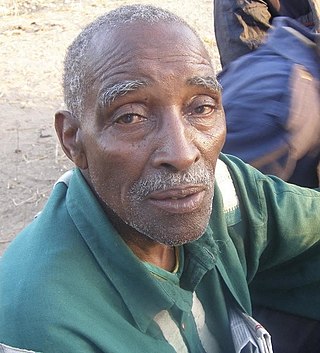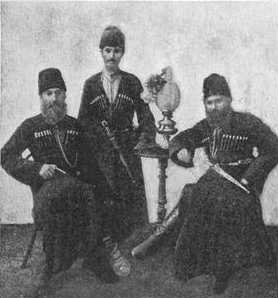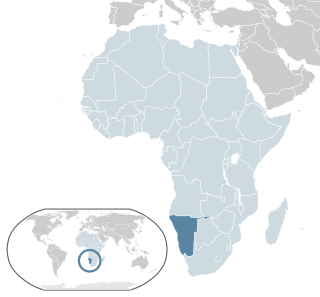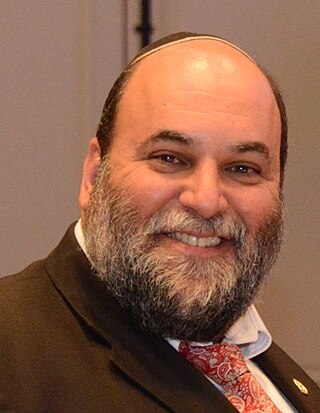Related Research Articles

Gaborone is the capital and largest city of Botswana with a population of 246,325 based on the 2022 census, about 10% of the total population of Botswana. Its agglomeration is home to 421,907 inhabitants at the 2011 census.

The Sena, Lemba, Remba, or Mwenye are a Bantu-speaking ethnic group which is native to Zimbabwe and South Africa, with smaller branches in Mozambique and Malawi. According to Tudor Parfitt, when he first worked in the field among the Lemba in South Africa, Zimbabwe and Malawi in the 1980s, they numbered an estimated 50,000. Some of their religious practices and beliefs are similar to Jewish and Islamic practices and beliefs. According to Parfitt, the Lemba claim that they once had a book which described their traditions but it was lost.

The World Jewish Congress (WJC) was founded in Geneva, Switzerland in August 1936 as an international federation of Jewish communities and organizations. According to its mission statement, the World Jewish Congress' main purpose is to act as "the diplomatic arm of the Jewish people". Membership in the WJC is open to all representative Jewish groups or communities, irrespective of the social, political or economic ideology of the community's host country. The World Jewish Congress headquarters are in New York City, and the organization maintains international offices in Brussels, Belgium; Jerusalem; Paris, France; Moscow, Russia; Buenos Aires, Argentina; and Geneva, Switzerland. The WJC has special consultative status with the United Nations Economic and Social Council.

Maghrebi Jews or North African Jews are ethnic Jews who had traditionally lived in the Maghreb region of North Africa under Arab rule during the Middle Ages. Established Jewish communities had existed in North Africa long before the arrival of Sephardi Jews, expelled from Portugal and Spain. Due to proximity, the term 'Maghrebi Jews' sometimes refers to Egyptian Jews as well, even though there are important cultural differences between the history of Egyptian and Maghrebi Jews. These Jews originating from North Africa constitute the second largest Jewish diaspora group.
The history of the Jews in India dates back to antiquity. Judaism was one of the first foreign religions to arrive in India in recorded history. Indian Jews are a small religious minority who have lived in India since ancient times. The 2,000-year history of Indian Jews was marked by a total absence of antisemitism from the Hindu majority and a visible assimilation in the local languages and cultures.
The history of the Jews in South Africa began during the period of Portuguese exploration in the early modern era, though a permanent presence was not established until the beginning of Dutch colonisation in the region. During the period of British colonial rule in the 19th century, the Jewish South African community expanded greatly, in part thanks to encouragement from Britain. From 1880 to 1914, the Jewish population in South Africa grew from 4,000 to over 40,000. South African Jews have played an important role in promoting diplomatic and military relations between Israel and South Africa. South Africa's Jewish community has reportedly declined from a possible peak of 120,000 to now between 52,000 and 88,000. Many South African Jews have emigrated to countries in the English-speaking world, such as the United States, Canada, the United Kingdom and Australia, as well as some emigrating to Israel.

The history of the Jews in Azerbaijan dates back many centuries. Today, Jews in Azerbaijan mainly consist of three distinct groups: Mountain Jews, the most sizable and most ancient group; Ashkenazi Jews, who settled in the area during the late 19th-early 20th centuries, and during World War II; and Georgian Jews who settled mainly in Baku during the early part of the 20th century.

The history of the Jews in Venezuela dates to the middle of the 17th century, when records suggest that groups of marranos lived in Tucacas, Caracas and Maracaibo. The Jewish community, however, did not become established in Venezuela until the middle of the 19th century. Since Hugo Chávez took power in 1999, tension has existed between the government and Jewish population, which has seen large numbers emigrating. Today, the majority of Venezuelan Jews live in Israel, while modern-day Venezuela continues to host a modest Jewish population.

A bilateral relationship exists between Armenia and Israel. From 1993 to 2007, Armenia was served by the Embassy of Israel in Georgia. In 1996, Tsolak Momjian was appointed the honorary consul of Armenia in Jerusalem. Eleven years later, the residence of the Embassy of Israel in Armenia was moved to Jerusalem. In October 2010, Shmuel Meirom was appointed the Israeli ambassador to Armenia. Armen Melkonian was appointed the Armenian ambassador to Israel in 2012, with a residence in Cairo. In October of that year, Melkonian presented his credentials to Israeli President Shimon Peres. On 21 September 2019 Armenia announced that it would be opening an embassy in Israel. Despite generally cordial ties between the two, relations soured after Armenia withdrew its ambassador to Israel due to Israeli arms supply to Armenia's enemy, Azerbaijan, in the 2020 Nagorno-Karabakh War.

Israel–Zimbabwe relations refers to foreign relations between Israel and Zimbabwe. Neither country has a resident ambassador.

Botswana is a Christian majority nation. However, the country is officially secular and allows freedom of religious practice.

The history of the Jews in Zimbabwe reaches back over one century. Present-day Zimbabwe was formerly known as Southern Rhodesia and later as Rhodesia.
The history of Gaborone began with archaeological evidence in the area around Gaborone dating back to 400 BCE, and the first written accounts of Gaborone are from the earliest European settlers in the 19th century. Since the 1960s, when Botswana gained its independence from Britain and Gaborone became the capital, the city has grown from a small village in the Botswana scrubland to a major center in southern Africa.

The first Jews arrived in Mauritius from Haifa, British Palestine, in the 1940s because they were denied entry to Palestine by the British Government. There are currently about 43 Jews in Mauritius. There is a synagogue in Curepipe, and a Jewish cemetery in Bambous. Judaism is a minor religion in Mauritius.

The history of the Jews in the Democratic Republic of the Congo can be traced back to 1907, when the first Jewish immigrants began to arrive in the country. The current Jewish Congolese population is mostly of Sephardi background.

The history of the Jews in Namibia goes back a little more than one and a half centuries. Non-existent in Namibia before the 19th century, Jews played an important if minor role in the history of Namibia since that point in time, despite their continuous small population. The most famous Namibian Jew was "businessman, philanthropist and Jewish communal leader" Harold Pupkewitz (1915–2012).
White people in Botswana are Botswanan people whose ancestry lies historically within the continent of Europe, most notably the United Kingdom, the Netherlands, and, more recently, directly from Serbia and other southern African nations.

Moshe Silberhaft is an Orthodox Rabbi who serves as the Spiritual Leader and CEO: African Jewish Congress, Botswana, DRC, Kenya, Lesotho, Madagascar, Mauritius, Mozambique, Namibia, South Africa, Swaziland, Uganda, Zambia & Zimbabwe; Rabbi to South African Country Communities, South African Jewish Board of Deputies. he is also known as "The Travelling Rabbi".
The history of the Jews in Mali dates back to the 8th century CE. Today, around 1,000 descendants of Jews live in Mali, mostly in or near Timbuktu.
References
- ↑ "Around the Jewish World in Botswana, African Jews Ask Leader to Be Vigilant Against Terror". Jewish Telegraphic Agency . Retrieved 2021-12-16.
- ↑ "Botswana Virtual Jewish History Tour". Jewish Virtual Library . Retrieved 2021-12-16.
- ↑ "Community in Botswana". World Jewish Congress . Retrieved 2021-12-16.